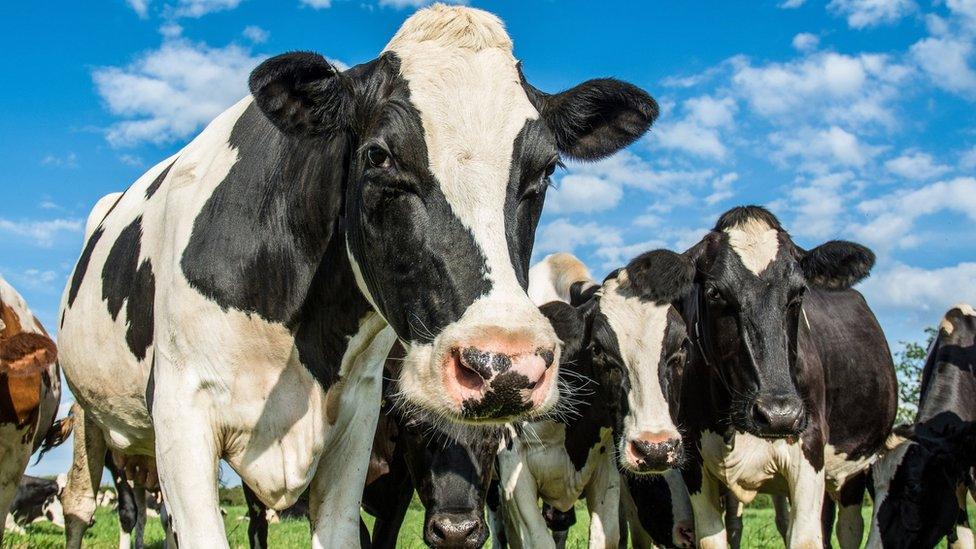UK farms plan for going 'carbon neutral'
- Published
- comments

Farmers could change the diets of livestock so that they don't belch so much methane
The farm union NFU has launched a plan to make British agriculture carbon neutral in two decades.
Farming creates 10% of the UK’s emissions, and farmers have long been criticised for their failure to tackle their pollution.
But the NFU says the industry can reduce gases almost completely by 2040 - a decade ahead of the government’s overall zero emissions target.
Environmentalists welcomed elements of the plan.
But Friends of the Earth said it was astonished there was no mention of eating less meat.
The NFU (National Farmers Union) says its three-part roadmap will produce quality, affordable food while tackling emissions.
It rests on improved productivity. increasing the number of trees and hedges, and growing more crops for energy.
How can farmers cut their own pollution?
The union says farmers can cut direct pollution from farming by working smarter to deliver the same value but with fewer emissions.
That would mean applying farm chemicals more precisely using satellite technology.
It would also see farmers capturing methane from manure to heat people’s homes.
Another idea would be to change the diets of sheep and cattle so they don’t belch so much methane.
Farmers could also introduce a wider variety of plant species to pastures.
How will farmers capture carbon from the atmosphere?

The report recommends farming in ways that increase the carbon content of soil
The second element of the plan is to capture carbon from the atmosphere by expanding hedges, planting more woods to soak up CO2 and farming in ways that increase the carbon content of the soil.
The third element is to increase the numbers of crops grown for energy, like coppiced timber, or crops grown for fibres such as hemp.
Some of these plans will be widely welcomed, especially those that will also boost wildlife and flood protection, as well as cutting emissions. Others will prove controversial.
Why are they proposing this plan?
NFU President Minette Batters said: “Climate change is one of the biggest challenges of our time.
“We recognise our unique position as both a source and a store for greenhouse gas emissions and, importantly, how we can deliver climate-neutral farming in 20 years.
“We aspire to be producing the most climate-friendly food in the world. The carbon footprint of British red meat is only 40% of the world average.”
There is, though, still debate among scientists over the best way to reduce emissions from livestock farming.
What do environmentalists think about it?
Friends of the Earth campaigner Guy Shrubsole said he was astonished the plan didn't include eating less red meat.
He said: “Eating less but better meat would free up much more land for woodlands and agroforestry (in which trees are grown alongside crops).
“But it seems the NFU is still not prepared to contemplate significant land use change, despite the Committee on Climate Change recommending this as being vital.
“The NFU has an opportunity to embrace a new approach to managing the land that benefits both farmers and the planet - something progressive farmers in the UK are starting to pioneer - but this report falls short."
Ms Batters said that, even if British consumers decided to cut their meat consumption, UK farmers could produce high quality low-carbon meat for export.
She said a more detailed carbon-cutting document would be published in future. But she emphasised every farm was different and would need to take its own approach.
Tomorrow a left-leaning think tank, Common Wealth, will call for re-wilding 25% of the UK. It will say this could provide approximately 70% of the capacity the UK needs to absorb CO2 emissions.
Follow Roger on Twitter, external.